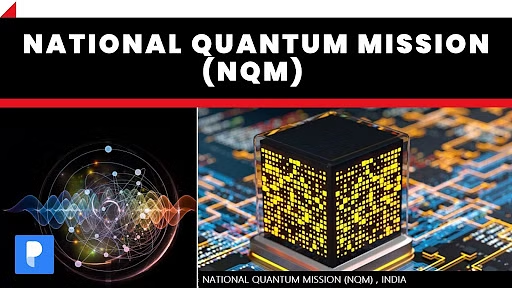
National Quantum Mission: A Big Leap Forward in Technology
Computer was invented many decades ago. With the development of electronics and software, there has also been a huge improvement in computer technology, which led to unprecedented progress in communication, diagnostics and health, energy, automobile, space, etc. This progress is also called the Fourth Industrial Revolution. But this development had its limits. Not only this, its biggest problem has been that computers could be infected or even captured by sending various types of viruses and malware or by hacking. This could bring down the entire system to the total halt. This has been happening in the past as well. Financial frauds is a routine matter in modern times. Hacking has been presenting a huge risk to even security of the nations. In this context Quantum Technology is being seen as a major development in computer systems, making computers faster, more efficient and more secure than ever before. After the Union Cabinet approved Rs 6003 crore for the National Quantum Mission, on April 19, 2023, India has become the 7th country in the world to have a 'Quantum Mission' of its own. Prior to this, only the United States of America, Austria, Finland, France, Canada and China had their own dedicated quantum missions. The issue originated in December 2018, when in its first term the Narendra Modi government, announced Rs 3660 crore for the 'National Mission on Cyber Physical Systems'.
Starting from April 2023, the National Quantum Mission will have four verticals. The first three verticals are - Quantum Computing, Quantum Communication and Quantum Sensing and the fourth vertical is the manufacturing of equipment for the above three programs. It is believed that even the countries adopting quantum mission before this are still at the research and development stage, and none of them has so far started the application of quantum technology. In this way, due to the adoption of the National Quantum Mission, India has also come at par with these countries. Quantum computers are much faster and more up to date than present day computers. This will lead to an unprecedented growth in computing power. They also have the ability to solve complex problems that are currently beyond our reach. Being based on the principles of quantum mechanics, quantum encryption techniques are more secure than traditional encryption methods. Quantum communication networks can transmit information faster and more securely than conventional networks, including being completely free from hacking. It has the capability of secure communication. Long distance communication is an important task in the work of this mission. As a result of this mission, there will be an unprecedented revolution in the communication system, India can assume a leading role in this field in the world. This mission will be operated by the Department of Science and Technology, Government of India. Under this mission, during the eight years between 2023 and 2031, the work of scientific and industrial research and development for quantum technology will be accelerated in the country and an environment for innovation will be created for the same.
Significantly, the computer processes of the present time are based on two digits 'one' and 'zero'. But in the process of quantum computers being built under this mission, there will be units of 'qubits' or 'quantum bits'. Computers with 50 to 100 cubits will be manufactured in the first 5 years and manufacturing of computers with 50 to 1000 cubits will start in 8 years. This mission will work towards manufacturing the equipment for these quantum devices. The satellite-based communication system will operate and secure quantum communication with other countries will also be possible, based on these computers. Significantly, India has made unprecedented progress in digitalization for some time. The 'JAM Trinity' of Jan Dhan accounts, Aadhaar and Mobile has made possible not only the delivery of public welfare services by the government, but also direct benefit transfers to the beneficiaries more efficient, apart from supporting online payment system. The payments which were earlier done through banking system or through cash, are now being done through Unified Payments Interface (UPI) in a very convenient way. On the other hand, where e-commerce has made life easier for the people, it has worst side effects on employment and livelihood of conventional traders and manufacturers. To solve this problem, the government is moving towards a new system called Open Network Digital Commerce. Success of UPI and other endeavours of the government towards digitisation, gives hope that India can play a leading role in this field globally. Quantum computing may help making all these systems much more efficient and secure.
Be it education, land records, medical and public health or the task of providing services to the citizens on a large scale, facilitated by big data, all these can be accomplished only with the latest computer system. But in the past, the cases of virus, malware etc. in the computer system and hacking by criminals and enemy countries have been increasing continuously. However, in spite of adopting effective measures to deal with all this, many times private individuals, corporate and government institutions, government departments, aviation systems, etc. have to bear heavy losses due to the fault-lines of the present system. The need was being felt for a computer system that was fast, capable of performing multidimensional processes, capable of handling big data, and most importantly is resistant to hacking. India cannot stay away from the research and innovation happening in quantum physics. The National Quantum Mission of the Government of India will take India ahead of the world in many areas including digitization, research and development, space science and better delivery of citizen services. India's progress so far in the field of computer and software is indicating that we can lead the world in this field in the coming years.


